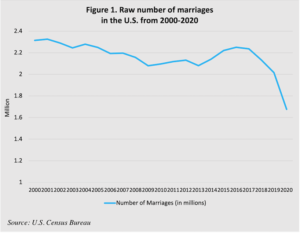It has unfortunately been well established that marriage rates have been declining in the United States and across the developed world for decades now. But a new report from the Institute for Family Studies (IFS) indicates that marriages have faced an increasingly precipitous decline since the middle of the previous decade. They explain, “Despite steady population increases each year, the number of marriages has been decreasing over the last 20 years” overall. The trend line is not encouraging.

But they also report new research just published in the Journal of Adult Development tells us an interesting story about who is still marrying. A team five scholars from Syracuse University explain, “We found statistically significant relationships between stronger religiosity and greater likelihood of marriage” with larger effects for seriously religious men than women. In short, young men and women who take their faith very seriously are much more likely to marry compared to their non-believing or moderately believing peers. And men who are very serious in their faith are the most likely.
IFS illustrates these findings further, “Marriage is slowly becoming an institution mostly utilized by the religious, who continue to view marriage as a symbolic representation of life-long commitment to one’s partner.” They add, “While non-religious couples certainly value commitment and still get married, more and more non-religious couples are opting for long-term cohabitation, while an increasing number of individuals in the U.S. and Europe are electing to remain single.”
Specially, nearly 100 percent of highly religious men (97%) were likely to be married by their mid-40’s, while only 65% of non-religious men were likely to be hitched. So, ladies looking for a potential husband, you would do well to focus your search on men who take their Christian faith very seriously. Men are wise to do the same with serious believing women.
And IFS explained that a serious faith itself tends to positively impact how such young men and women approach marriage formation itself.
When religiously serious couples “talked about their courtship process during young adulthood, they approached dating and marriage differently than others in their cohort.” They continue, “For example, religious individuals were much more likely to have dated in young adulthood with marriage in mind and were more likely to prioritize getting married over other life goals.”
While such traits were common among most segments of the population a few generations ago, they now appear to be primarily concentrated among dedicated religious married couples. And as the IFS report explains, these qualities “are a contributing factor in why they are so much more likely to marry than their peers.”
Some scholars have questioned whether marriage still provides the rich life benefits decades of research have shown. But this IFS article explains “that married Millennials were still, in fact, reaping the benefits of marriage, regardless of their religious beliefs or behaviors.”
Married Millennials are still…
- more likely to report satisfying and stable relationships compared to Millennials in other types of committed relationships;
- more likely to have better access to health care, retirement benefits, and insurance compared to unmarried Millennials;
- reporting better health and more regular exercise than those who weren’t married, and;
- significantly less likely to report depression than single Millennials.
IFS concludes,
“These findings confirm that married couples still reap the benefits of the long-term stable relationship that their union provides. These financial, emotional, and physical benefits have been documented across multiple datasets and still exist for the rising generation.”
So, while marriage has been declining among various populations, and dramatically so, it certainly is good news that people of faith, including younger couples, are still marrying in stronger numbers, while science continues to demonstrate marriage still matters and makes measurable positive impacts in the lives of men, women, and their children.
Photo from Shutterstock.






